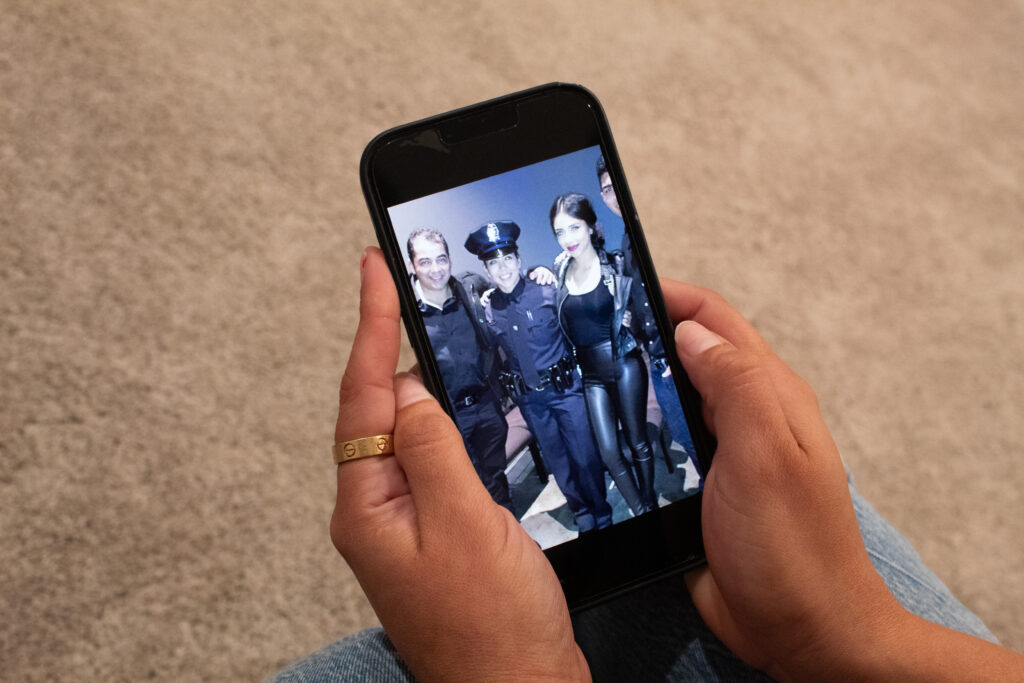
Citlaly Gomez wanted to be the kind of police officer she wished she had seen growing up in Nashville: a woman, Latina, speaking Spanish and engaging with the community. But it quickly became clear to her how things really worked inside the male-dominated department.
“I didn’t have to just watch my back from, like, everything that happened in the streets,” Gomez says, “But my own supervisors, my own co-workers.”
She was 24 when she started at the police academy. She was one of a handful of female officers in her graduating class. MNPD’s current roster shows that about 12% of sworn officers are women. She says often she was the only woman in the room.
“If you wanted to fit in, you had to kind of put up with the stuff that was being said,” she says, “Whether you liked it or not.”
Male officers would make lewd comments about her looks, about her body. They would ask her out, and ask her to go to a hotel or on a trip with them. A few would send her naked photos, and request some in return.
“Just that stigma of just you being a female, this is what you kind of have to put up with,” she says. “I know I’m not the only one out there. I might be the only one that spoke up, but this has happened to other females in the department.”
Not only did Gomez speak up, she left the department and brought a lawsuit. It charged that over the course of her six years at MNPD, more than a dozen officers sexually harassed her. Many of them are still with the department.
And she says she was retaliated against when she would report the harassment. In one case, a male officer was punished for one day for making inappropriate comments to Gomez. Gomez was given four days for running an errand while on duty.
The department declined to do an interview for this story, and said that they encourage employees to come forward with complaints.
The head of the Office of Professional Accountability, Kathy Morante, did testify during Gomez’s trial about the alleged retaliation.
“If we are giving given information that any officer — even if it comes up after a sexual assault allegation — has been doing policy violations that are … that are dangerous, that are very serious to the department, we’re obligated to look into those,” Morante said.
Former police officer Greta McClain says this tactic is common at MNPD. It’s used as a way to keep people quiet.
“If they want to look hard enough, you know, we all make mistakes and they can find some reason to to punish you for something,” McClain says.
Gomez’s case follows a pattern at the department, she says.
Back in 2020, McClain helped more than 70 police officers come forward with allegations of sexual harassment and even assault inside MNPD.
More: Behind The Blue Wall: Officers Describe A ‘Toxic’ Culture Within Metro Police
It peeled back the curtain on a culture that had largely gone unchecked. And one that officers worried would spill over into the community.
“If they’re going to treat their own in this way,” McClain says, “what do you think they’re going to do to an average citizen?”
Her organization, Silent No Longer, met with city leaders to come up with policy recommendations to handle sexual harassment claims — like outsourcing investigations and making them faster and more trustworthy.
The Tennessee Bureau of Investigation got involved, and the police department said it examined the allegations for policy violations.
But McClain says very few changes were made.
“That, in my opinion, is a failure of management,” she says. “Yes, we need officers on the street to keep keep the public safe. But you can’t allow people who are violating law to remain, you know, in law enforcement.”
Instead, it’s usually the officers that are harassed who leave.

Gomez holds her phone with a photo of her and her family from police academy graduation.
For Citlaly Gomez, leaving the department was not a part of her plan. She resigned in 2021 after she was accused of shoplifting. Those charges were dropped.
“I didn’t know what was next,” she says. “What was the next chapter? Am I going to be able to turn that page? It was hard not knowing if I was going to be able to keep moving forward.”
Winning the lawsuit marked the end of that chapter.
Her lawyer, Jason Lee, says usually Metro settles these types of suits outside of the courtroom. But Gomez’s case went to trial, and a jury of her peers awarded her the maximum amount the city can pay out: $300,000.
Now, she has a fresh start.
She left the house that she lived in when she was an officer. It was too full of painful memories.
There’s no trace of MNPD in her new home — no photos on the walls, no uniforms hanging in the closet. She doesn’t want to encourage her 5-year-old daughter’s interest in her time as an officer.
“I feel like a lot of the things I did, I did for my daughter,” Gomez says. “So she would grow up to be a strong woman — to know that she doesn’t need to put up with all this stuff, that she doesn’t need to be quiet, that this is not okay.”
She’s let go of trying to be the officer she wanted to see growing up. Instead, by speaking out, she hopes she’s set a different type of example.

